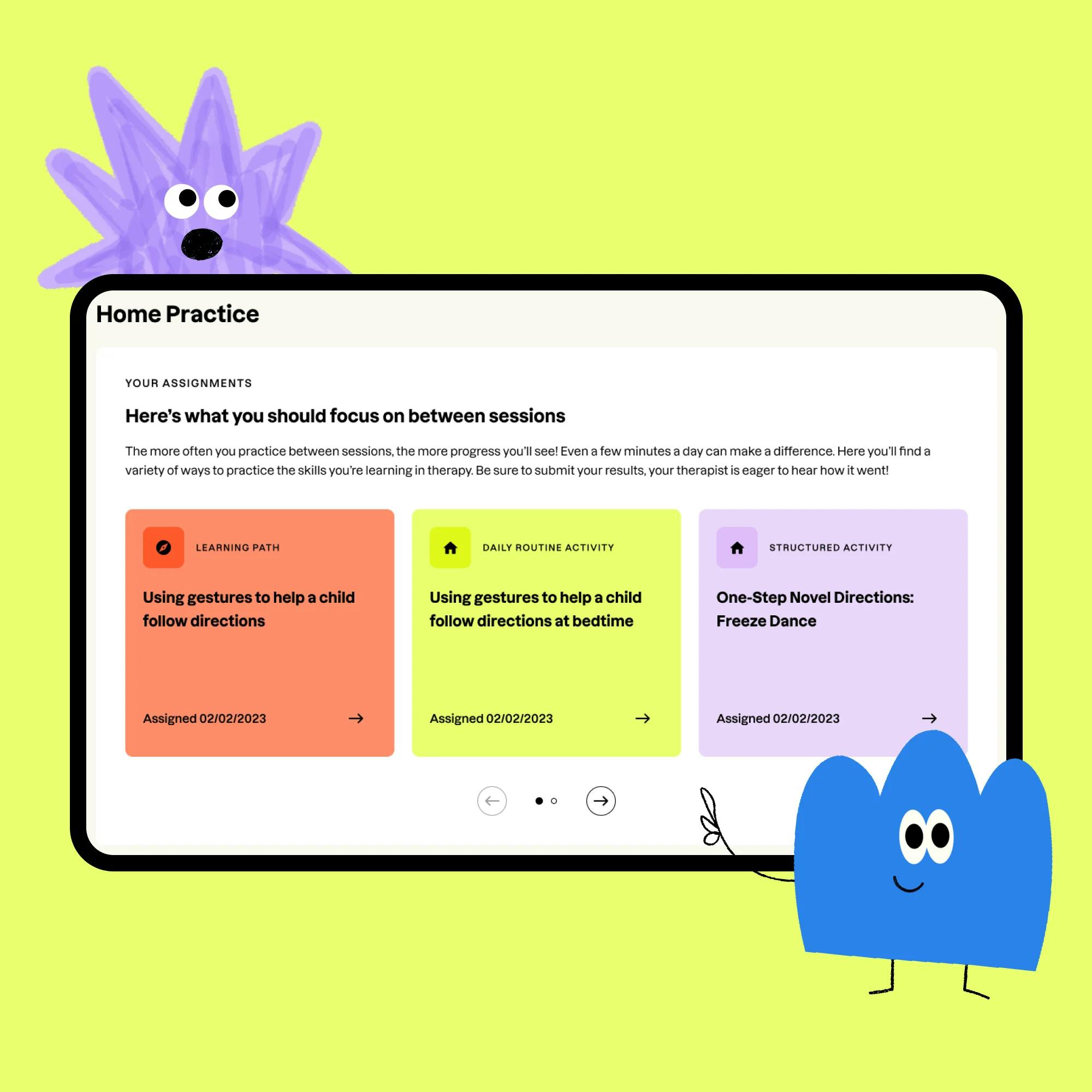For many children, stuttering, also known as stammering, is developmental. It’s simply a natural part of learning language, and they’ll eventually outgrow it. For others, however, stuttering may be a chronic condition that persists throughout their life.
As a parent or caregiver, it can be upsetting to watch your child struggle to communicate. You may be asking yourself, “Will my child outgrow their stutter?” “Should I be concerned enough to get speech therapy?” “How will stuttering affect my child’s self-esteem and social relationships?”
If you’re a teen or adult who stutters, you may be looking for ways to stop stuttering and speak more freely.
Expressable speech therapists work with people of all ages who stutter. Whether you’re a parent of a child who stutters, or an adult seeking guidance and support, we’ve put together this informational guide to answer your questions. Learn what causes stuttering, what the different types of stuttering sound like, and how stuttering can be treated and managed.
Support for people who stutter
Speech therapy can build your confidence and help you speak more freely. Find the right speech therapist for the support you need.
 Get started
Get startedWhat is stuttering?
Stuttering, sometimes called stammering or disfluency, is a communication disorder that disrupts the natural flow of speech. Stuttering can begin gradually and develop over time, or it can appear suddenly.
People who stutter may:
Repeat certain syllables, words, or phrases ("li-li-like this")
Prolong them ("lllllike this")
Experience abnormal stops of certain sounds and syllables
There are several types of stuttering:
Developmental stuttering: This is the most common type of stuttering in children. It usually happens between the ages of 2 and 5. Developmental stuttering most often occurs when children's speech and language abilities are unable to meet their verbal demands.
Neurogenic stuttering: Neurogenic stuttering may happen after a stroke or brain injury. It's caused by signal problems between the brain and the nerves and muscles involved in speech.
Psychogenic stuttering: Psychogenic stuttering is not common. It may happen after emotional trauma, or it can accompany problems with thinking or reasoning.

Is stuttering a disability?
There are still many misconceptions about stuttering. Stuttering is not a psychological disorder, mental disorder, or learning disability. Stuttering is a difference in verbal communication. It is a form of verbal diversity. A stutter is a part of a person, just like the color of their eyes.
However, stuttering can qualify as a disability. This means the person who stutters can receive accommodations and support in school or at work. In order for a person to receive these services, they will likely need a fluency disorder diagnosis.


How common is stuttering?
According to the Stuttering Foundation, over 3 million people in the United States stutter.
About 5% of all children go through a period of stuttering that lasts six months or more. As many as 75% of those children will recover by late childhood. Those who continue to stutter into school-age years are likely to have a more serious problem and continue to stutter in some way throughout their lives.
In adults, approximately 2% of the population between the ages of 21 and 49 stutters. Less than 2% of adults ages 50 and over stutters.
Stuttering is much more common in males than females, with males being about four times more likely to have stuttering issues.


What does stuttering sound like?
Every person is different, and the symptoms of stuttering can vary considerably. However, here are some of the most common signs of stuttering to look for:
Repeating sounds, syllables, words, or phrases
Prolonging sounds
Routinely using interjections when speaking, such as “um” or “like,” that disrupt the flow of speech
Talking slowly
Taking a lot of pauses when speaking
Stopped or blocked speech; the person’s mouth may open, but nothing is being said
Routinely being out of breath when talking
Fast eye blinking, trembling, or shaking lips when speaking
Increased stuttering when tired, excited, or under stress
Being afraid or nervous to talk
What causes stuttering?
Unfortunately, researchers do not yet know the exact cause of stuttering. However, many experts believe there are several risk factors that contribute to stuttering. If any of these situations apply to you, it’s important to talk with a doctor or speech-language pathologist:
A family history of stuttering: While there is still uncertainty about whether stuttering is genetic, nearly 60% of all people who stutter have someone in their family who also stutters or stuttered.
Child development: Children who have other speech and language disorders have a higher chance of stuttering than children who don’t.
Neurophysiology: It has been observed that some children who stutter process language in different parts of their brain than children who don’t stutter. This may interfere with how the brain sends messages to the muscles involved in speech.
Family dynamics: Some children's stuttering has been linked to high family expectations and a fast-paced lifestyle.
Late or adult-onset stuttering: This often occurs when stuttering symptoms appear later in life and are not attributed to a speech-motor or neurological issue. Sudden stuttering in adults can be caused by a stroke, tumor, or trauma.
Ada's story
After sudden stuttering took over Ada's speech, online speech therapy helped her regain her confidence and say what she wanted to say.
 Read Ada's story
Read Ada's storyWhat are the long-term consequences of stuttering?
For many children and adults, stuttering itself isn’t the worst part of the condition--it’s the impact on their daily lives. When people stutter, they feel like they’ve lost control of one of their most basic functions. This can be humiliating, uncomfortable, and unnerving. Stuttering can lead people to feel anxious about speaking. They may be less active or involved in the classroom or at work, avoid social interactions, and worry that they’ll be teased or embarrassed.
For older children and adults, these effects can be worse. Many avoid social situations altogether. They feel constant frustration and embarrassment about how they talk. Adults who stutter can be stereotyped as being shy, self-conscious, or lacking confidence.
Ironically enough, many of our natural coping mechanisms can actually worsen stuttering. For example, people often try to avoid stuttering by speaking quickly, or by not speaking at all. Trying to stop a stutter in these ways actually increases the likelihood of stuttering.


When should I seek speech therapy to fix a stutter?
As with most developmental issues, the earlier therapy begins, the better! Talk with your doctor if you’re concerned about your child's stuttering. In many cases, your doctor may refer you to a speech-language pathologist, also known as a speech therapist. Speech therapists are the most qualified professionals to evaluate your child’s speech.
Signs that suggest your child’s stuttering is more severe, and that you should seek a speech evaluation, include:
Your child’s stuttering is getting worse over time
They make body or facial movements when speaking, called secondary stuttering behaviors
Their speech is especially strained
Your child is actively avoiding situations that require talking
Stuttering continues after your child has turned 5 years old
It’s never too late to benefit from stuttering therapy. Adults who want to fix a stutter should also speak with their doctor or a speech therapist. Often, learning to manage stuttering is a lifelong process.

How is stuttering diagnosed?
Despite breakthroughs in our understanding of stuttering, there is still no therapy, device, or drug that can “cure” stuttering. However, early treatment can prevent stuttering from continuing into adulthood. Treatment will depend on your child’s symptoms, age, and general health. It will also depend on the severity of the condition.
To diagnose stuttering, your doctor may ask questions about your family history with stuttering and review your child's symptoms. In many cases, they will refer you to a speech therapist.
Your speech therapist will evaluate your child’s speech. At Expressable, speech therapists choose from a variety of standardized or norm-referenced tests for the evaluation. They may assess your child via a conversational speech sample, structured speech sample, reading sample, percent-syllables-stuttered analysis, and social-emotional questionnaire.
The speech therapist will also ask questions about your child’s medical background and how they communicate at home. The evaluation results will be used to develop a personalized care plan for your child, which typically includes two therapy sessions per week.


What does speech therapy for stuttering look like?
It’s important to realize that every person is unique. Stuttering therapies that benefit some people may not work for others.
At Expressable, your speech therapist will work with you to develop an individualized treatment plan to help your child speak more smoothly. Your therapist will also help your child learn to cope with their stutter.
A key part of speech therapy for kids who stutter is caregiver education. Expressable speech therapists are skilled at coaching parents and caregivers to understand how to support their child.
For people who want to fix a stutter, your speech therapist will introduce a variety of fluency techniques to see which work best and feel most natural.
For older children, teens, and adults, treatment focuses on managing stuttering. A speech therapist will help you feel less tense and speak more freely in school, at work, and socially. Therapy can focus on counseling, reducing avoidance behaviors, and learning to advocate for yourself. These strategies can help people in situations that make them nervous or uncomfortable, such as talking on the phone or ordering food at a restaurant.
Support for children who stutter
Speech therapy helps kids who stutter boost their confidence and speak more freely. Find the right therapist for your child at Expressable.
 Get started
Get startedTechniques that help prevent stuttering
For people who want to fix a stutter, your speech therapist will introduce a variety of fluency techniques to see which work best and feel most natural. Techniques can focus on many aspects of stuttering, although a primary goal is usually learning to speak more freely and confidently. Many people who stutter want support with:
Repeating sounds or words
Using "um" or "like" frequently
Speech that doesn't seem to flow
Poor breath support when speaking
Being afraid to speak in certain situations
At Expressable, common strategies to stop a stutter might include:
Light articulatory contact
Easy onsets
Pausing and chunking
Joseph's story
Discover how Joseph, a preteen who stutters, transformed his speech, confidence, and sense of control.
 Read Joseph's story
Read Joseph's storyLearn stuttering strategies through the Expressable portal
Your speech therapy doesn’t stop when the session ends. At Expressable, you’ll get access to our client portal, which makes practicing stuttering techniques easier and more effective. Here’s what you’ll find:
Learning Paths that explain and reinforce therapy strategies
Demo videos that show real techniques in action, such as continuous phonation and the passive airflow technique.
Home practice activities you can do during your everyday routine, such as the attention shifting technique and mindfulness strategies.
Text messaging support so you can ask questions or get tips from your therapist between sessions.
By using the tools in the portal and practicing regularly, you or your child can make faster progress!


Other therapies and treatments for stuttering
In addition to speech therapy, other therapies and treatments that may help stop stuttering include:
Cognitive behavioral therapy (CBT): CBT helps adults cope with their communication disorder in order to lessen the impact and burden it has on their quality of life.
Electronic devices: Electronic devices sit in a person’s ear and are intended to help improve the fluency of their stutter. One example is an Altered Auditory Feedback (AAF) device. Research has shown that some individuals who stutter benefit from extending the time between speech and auditory perception. These devices can help mimic this sensation by allowing the person to hear their own voice with a slight time delay, creating the illusion of another person speaking at the same time.
Support groups: You are not alone, and support groups are a great way to meet other people who are also dealing with stuttering. Support groups can help you build self-confidence, practice speaking in a safe and accepting environment, and explore new ways to cope with stuttering
How does online speech therapy work for stuttering?
Expressable matches families and adults with a licensed speech therapist trained to evaluate and treat stuttering. All therapy is delivered online via face-to-face video conferencing on Zoom. Research has shown that online speech therapy works just as well as in-person therapy for stuttering. Online speech therapy makes it easier for parents and caregivers to be involved, and at Expressable, parent coaching is a key part of our treatment model. Your child’s age and development will influence how your speech therapist interacts with them and you during sessions:
Ages 0-3: Caregivers attend sessions and work directly with their child's speech therapist to learn cues and at-home strategies. This way they can confidently practice with their child throughout the week and help their child make progress. Ages 3-6: Caregivers attend video sessions alongside their child so they both learn valuable skills from their speech therapist. Reinforcing these lessons outside the session will continue to promote skill-building. Ages 7 and up: Most children attend video sessions independently, but parents are kept in the loop with updates and tips during each session.
Adults: Adults attend sessions by themselves but are welcome to bring loved ones or family members as well.


Tips for supporting your child who stutters
One of the best tools children have to manage their stuttering is you, their caregiver. Many studies show that caregivers play an essential role in helping their child reach their speech goals. After all, you spend the most time with your child, and there are many simple things you can do every day to help them.
While we’re providing a few tips here, your speech therapist will have specific recommendations for how to help your child with their stutter at home:
Find opportunities to speak with your child that are fun, relaxing, and enjoyable. Putting pressure on children can increase their stuttering.
Try not to react negatively or insist on correct speech when your child stutters.
Try not to fill in the blanks. When your child is struggling to say a word or sentence, let them finish without saying it for them.
Although you may find yourself saying things like "take a deep breath" or "slow down" with the best intentions, this can actually make children more self-conscious.
Model a slow, relaxed way of speaking. This will help your child slow down their own speech.
Don't be afraid to talk with your child about stuttering. If they ask questions or express concern, help them understand that speech disruptions are normal and many people have them to some degree. If your child is in school, educate their teachers to help them provide a classroom environment that’s safe and accepting.
Get started with Expressable
Speech therapy helps people who stutter speak more smoothly and freely. Find the right speech therapist for you or your child at Expressable. Start our simple sign-up here!
How Expressable Can Help
Concerned your child isn't reaching age-expected milestones? Looking for communication support from a professional? Expressable is a national online speech therapy practice serving children and adults. We treat all major areas of communication and feeding, offer flexible hours including evenings and weekends, and accept most major health insurance plans. We’re proud to have earned more than 3,000 5-star reviews from our clients (4.9/5 average).
Our therapy model is centered on parent and caregiver involvement. Research proves that empowering caregivers to participate in their loved one’s therapy leads to better outcomes. That’s why we combine live, 1-on-1 speech therapy with personalized education and home practice activities for faster progress.
Communication is more than words. It’s how we share how we feel and show who we are. We’re here to help you or your child do just that.
 Abby Barnes, M.S., CCC-SLP
Abby Barnes, M.S., CCC-SLP










